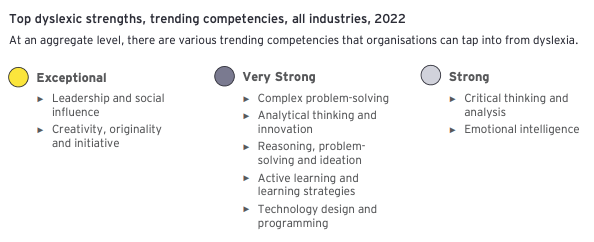The reason why you should hire someone with dyslexia

As businesses and workplaces shift to make way for automation and artificial intelligence, the workforce of the future will look very different to the workforce of today.
As a result of these changes, jobs will shift accordingly and new skills will be required, according to a new report by EY in association with Made By Dyslexia.
“Organisations are looking to bridge the skills gap; this shift requires different minds to fulfil differentiated tasks,” the report said.
Related story: 10 skills you won’t need by 2022 — and 10 you will
Related story: Why tech skills aren’t the key to success in a digitalising workplace
Related story: The 10 rising job skills you’ll need for the future, according to LinkedIn
And who should fill these gaps? According to the report, those with dyslexia are a perfect fit for the upcoming workplace changes.
“Dyslexia, a cognitive difference in information processing, has specific strengths that organisations can harness as part of an organisational capability,” the report said.
“Competencies in the workplace that dyslexic individuals may typically find challenging will largely be impacted by forms of automation; in their place, enhanced tasks and new roles will be created that match closely to the strengths of dyslexic thinking.
“A different approach, focused on both remediation of dyslexic challenges and the targeting of strengths through skills, could provide an opportunity to refocus effort and assist with bridging the skills gap.”
Famous dyslexics include Albert Einsten, Leonardo da Vinci, Richard Branson, Orlando Bloom, Walt Disney, Pablo Picasso, Steven Spielberg, Keira Knightley and more.
In a blog post earlier this month, Branson wrote a blog post crediting his success to his dyslexia.
“My dyslexia has shaped Virgin right from the very beginning and imagination has been the key to many of our successes. It helped me think big, but keep our messages simple,” he said.
Children should not be told to think in the same way, he added.
“We should support and celebrate all types of neurodiversity and encourage children’s imagination, creativity and problem solving – the skills of the future.”
Dyslexics have the skills we need
According to the report, dyslexic thinking has particular strengths and competencies that organisations desire, such as leadership and social influence as well as creativity, originality and initiative.
Dyslexics are also very good at complex problem-solving, analytical thinking and innovation, reasoning, technology design, and critical thinking.

According to EY lead contributor and dyslexia community chair Ben Cooke, businesses’ hiring strategies will have to shift.
“Organisations that are able to crack the code between neurodiversity, organisational culture, and workforce augmentation, will no doubt be at the forefront of driving even greater business value,” he said.
“This can only be achieved if organisational approaches to dyslexia, and more broadly varying cognitive profiles, are at the front and centre of the organisational strategic agenda.”
Business leaders should share best practices and insights in order to get the most out of dyslexia; automation and people strategies should be invested in; and a “neurodiverse capability” should be developed to recognise different cognitive profiles.
Make your money work with Yahoo Finance’s daily newsletter. Sign up here and stay on top of the latest money, news and tech news.

 Yahoo Finance
Yahoo Finance 
